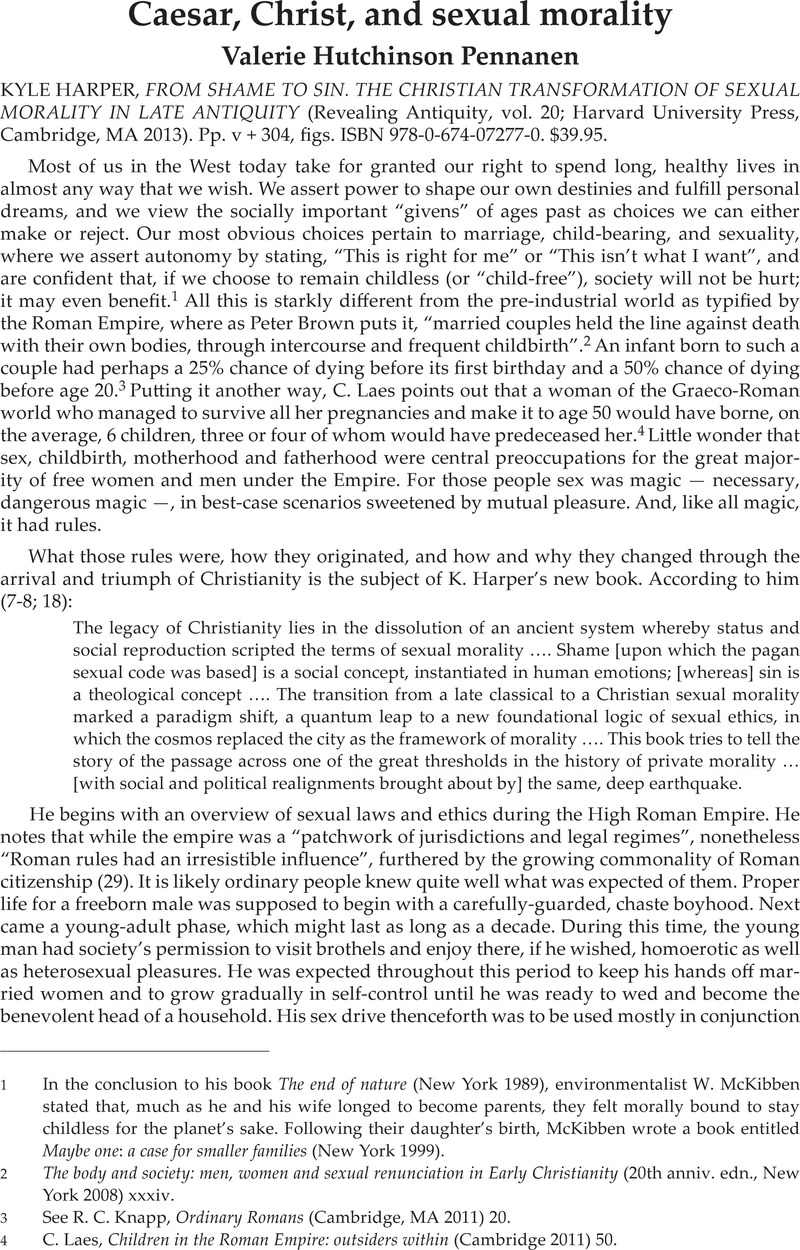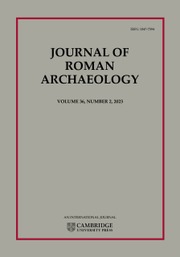No CrossRef data available.
Article contents
Caesar, Christ, and sexual morality - KYLE HARPER, FROM SHAME TO SIN. THE CHRISTIAN TRANSFORMATION OF SEXUAL MORALITY IN LATE ANTIQUITY (Revealing Antiquity, vol. 20; Harvard University Press, Cambridge, MA 2013). Pp. v + 304, figs. ISBN 978-0-674-07277-0. $39.95.
Published online by Cambridge University Press: 27 November 2014
Abstract

- Type
- Reviews
- Information
- Copyright
- Copyright © Journal of Roman Archaeology L.L.C. 2014
References
1 In the conclusion to his book The end of nature (New York 1989), environmentalist W. McKibben stated that, much as he and his wife longed to become parents, they felt morally bound to stay childless for the planet’s sake. Following their daughter’s birth, McKibben wrote a book entitled Maybe one: a case for smaller families (New York 1999)Google Scholar.
2 The body and society: men, women and sexual renunciation in Early Christianity (20th anniv. edn., New York 2008) xxxivGoogle Scholar.
3 See Knapp, R. C., Ordinary Romans (Cambridge, MA 2011) 20 Google Scholar.
4 Laes, C., Children in the Roman Empire: outsiders within (Cambridge 2011) 50 Google Scholar.
5 Cf. Johns, C., Sex or symbol: erotic images of Greece and Rome (London 1982) 63–64 and color pl. 10Google Scholar.
6 Harper does briefly address the matter of bodily privacy, observing (42) that “public bathing, at times even mixed bathing” was practiced in Roman society, while Knapp (supra n.3, 47) cites epigraphic evidence that children sometimes appeared at the baths as well. The Romans’ matterof-fact use of public latrines underscores the fact that they (like most pre-modern peoples) were far less prone to bodily embarrassment than are we today.
7 Brown notes: “In the ancient world … female orgasm was often treated as the sine qua non for conception …. Even in the most orderly Christian marriage, something, at some time, had to explode, if children were to ensue” (xlii); and ”To make love was to bring one’s blood to the boil, as the fiery vital spirit swept through the veins, turning the blood into the whitened foam of semen” (17).
8 See, in particular, Knapp (supra n.3) 24 and 28-29 (PGM 1.121-4 Luck).
9 See Brown (supra n.2) 12. For a 19th-c. American parallel, see Narrative of the life of Frederick Douglass, an American slave (1845) chapt. VI. Douglass observes that relatively few city slave-holders were “willing to incur the odium attaching to the reputation of being a cruel master”, owing to “a vestige of decency, a sense of shame” that feared disapproval from nearby neighbors. Violent treatment of slaves was much easier to get away with on the plantations and, hence, more common there. At least in the Roman provinces, slavery was associated more with urban environments than with the countryside, so worry about what the neighbors might say could have exerted similar pressure on slave-owners.
10 Knapp (supra n.3) 137-38 (on sexual abuse of personally owned slaves) and 147-51 (on master-slave negotiations).
11 Ibid. 262 and 243.
12 Ep. 10 (quoted by Knapp ibid. at 130).
13 BGU 4.1024, cited by Knapp ibid. at 244-45 and discussed by Bagnall, R. G., Egypt in late antiquity (Princeton, NJ 1995)Google Scholar, who notes (199): “If there was a move toward stricter codes of sexual behavior during this period, it may have been quite independent of Christianity”.
14 Brown (supra n.2) 24, with references.
15 The question of who ‘invented’ free will — whether Epictetus or Justin Martyr or someone else — is probably insoluble. Solon is known to have pondered the rôle of fate in men’s lives as early as the 6th c. B.C. The respective arguments of Essenes and Sadducees (with Pharisees staking out a middle ground) form an important part of the Jewish tradition: cf. A. Steinberg, “Free will vs. determinism in bioethics: comparative philosophical and Jewish perspectives” (1991), available at www.jewishvirtuallibrary.org.




